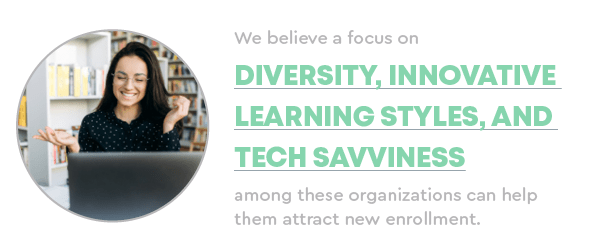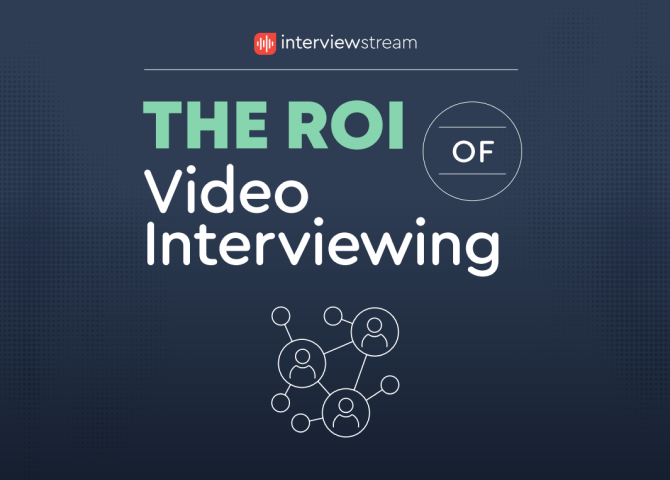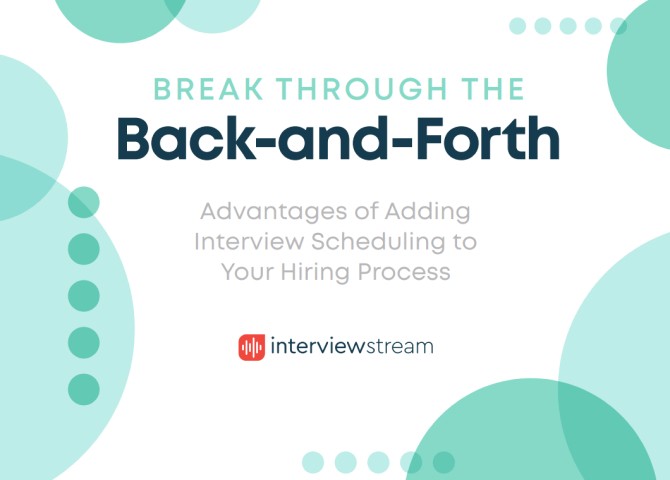Mid-Year Outlook: 2021 Workforce Projections for Every Industry

The rundown
- As economic uncertainty turns a positive corner, we’re seeing a mass exodus of talent across industries — dissatisfied employees are looking for something better and feeling confident enough to take a leap
- With remote work remaining popular and travel restrictions still in place, remote interviewing isn’t going away — and mastering it will be key to attracting the best talent
- Job seekers aren’t interested in working for companies with poor reputations or unimpressive employer brands
- 82% of global employers plan to hire in 2021
- The key to rebuilding your workforce is to treat candidates like humans by meeting them where they are and showing them you’re invested in their success
Table of contents
- 2021 in Recruiting: What We’ve Seen So Far
- K12 Education
- Higher Education
- Finance
- Government
- Healthcare
- Insurance
- Manufacturing
- Retail
- Staffing & Recruiting
- Technology
- Final Thoughts
- About interviewstream
2021 in Recruiting: What We’ve Seen So Far
Although the COVID-19 pandemic has not yet come to a close, the economic uncertainty it has caused is taking a positive turn as we march into the second half of 2021. In fact, according to a survey by Monster, 82% of global employers plan to hire in 2021. Some industries, such as technology, are planning on net new hires. Others have roles to backfill after the uncertainty of last year.
Additionally, experts have noted a resignation boom: Many dissatisfied employees are feeling confident enough to take a leap and seek new opportunities elsewhere.
So, what now?
The good news is: The talent you need to round out your team is out there. Bad news? Those candidates may be choosier than ever, and your recruiting process must shine to attract the best of the best. To give you a competitive edge in this new world, take a look at some of our projections for these major industries through the rest of this year.
K12 Education
Hiring in public-sector educators was down significantly in 2020 — enough to show a shortfall in jobs without a noticeable uptick in layoffs for this sector. Now, as the economy shows reassuring signs of recovery, school districts are faced with a myriad new challenges. Some have budget deficits, and many continue to navigate the difficulties of adapting to ever-changing pandemic guidelines as well as unpredictable enrollment.
Additionally, hybrid schooling — with some remote students and some onsite — may not go away in the coming months or even years, pressuring some school districts to fine-tune their tech strategies for the long term.
Projection: Some schools and districts may still face budget shortfalls, but others, as local economies recover and the savings brought by slower hiring over the last year emerge, may not suffer as much as previously predicted. Especially forward-thinking districts may up-level their tech hiring game, to adapt to evolving educational norms.
Interested in our HR newsletter? Sign up below!
Sign up for our newsletter – we send out an email every 6 weeks which includes HR trends, industry-relevant knowledge, and the latest interviewing tips for recruiters and candidates.
Higher Education
The “college experience” looks a lot different in 2021 than ever before, and colleges are facing a watershed moment as they attempt to adjust their strategies accordingly. New approaches to their coursework — including more online, accelerated, and even short-term certificate programs — are more important than ever. At the same time, perfecting on-campus culture and community is crucial to encourage students to return to campus and attract new enrollments.
Still, most colleges and universities are suffering from budget losses, layoffs, and difficulty maintaining important research and academic pursuits.
Projection: Budget cuts and highly conservative staffing decisions are likely to continue in this space. However, we believe a focus on diversity, innovative learning styles, and tech savviness among these organizations can help them attract new enrollment and evolve into the next generation of higher education.

Finance
The global financial services market size is expected to grow from $20.4 trillion in 2020 to $22.5 trillion in 2021, according to research by the Business Research Company. Organizations in this space are rearranging and recovering from the pandemic’s effects quickly, and momentum is on the upswing.
However, a meQuilibrium study on pandemic effects on employees showed a 32 percent decrease in motivation in the financial sector — and, coupled with an increased need for innovation and digitization among these groups, that is no small challenge for HR teams.
Projection: Attracting talent to fill new roles and replace vacated ones will be crucial through the rest of this year. Finance organizations will want to put their best foot forward when it comes to authentically supporting employees’ wellness, as well as showcase their commitment to forward-thinking tech strategies with the right hiring tools.
Government
According to the Bureau of Labor Statistics, government employment rose in April of this year, but is still down 1.2 million jobs compared to its peak in February 2020. With the new administration and a new budget still coming together, employment prospects in the public sector have been subject to shifting expectations halfway into the year.
However, one thing is certain: In this sector, as with many others, digitization is here to stay. Remote work is very common for government employees, and virtual recruiting is, too.
Projection: As federal functions evolve under the new administration, and state and local governments continue adapting, the talent shortage in the public sector will continue. Inviting new recruits to participate in public service will require fast-moving recruiters to attract talent from all over the country and move candidates through interviewing phases quickly with modernized tools.
Healthcare
Although healthcare organizations have been hard at work supporting the world through a medical crisis during this pandemic, they’ve also suffered from a drop in revenues as elective procedures and drop-in visits continue to remain low. Unsurprisingly, employee happiness has been alarmingly low throughout the pandemic as well: According to research by Medscape, only 49% of doctors surveyed reported they were happy in 2020, compared to 69% pre-pandemic.
As a result, a post-pandemic healthcare sector is faced with provider shortages, sustained demand for telehealth options, and the need to lift up essential workers facing extreme burnout. Executives are optimistic things will look up soon, but there’s work to be done to get there.
Projection: The surge in turnover among healthcare professions will likely continue through much of this year as providers bow out of high-stress roles now that the pandemic is beginning to ebb. Hiring teams will need to move fast in this space, too, and focus on soft skills — such as tech savviness for ongoing telehealth work — in order to scoop up talent, particularly as roles open to accommodate more elective procedures.
Insurance
The insurance space has added jobs between 2020 and now, with industry-specific unemployment rates sitting at just 2.2 percent (compared to 6.3 percent for the economy as a whole) in February of this year. It’s a healthy space to work in a post-pandemic world.
This means insurers have an opportunity to attract talent displaced from other industries, but they’ll need to continue to embrace remote hiring, wellness, and diversity programs to authentically and effectively bring in new candidates.
Projection: Accommodating internal moves and promotions will be a savvy strategy for those who wish to make the most of the talent they already have and lift up morale. Nevertheless, many insurers will also need to make outside hires for innovative roles in data science, cyber insurance, and risk adjustment.

Manufacturing
The focus on employee health and safety in the manufacturing space remains top of mind for HR teams this year. After much scrutiny in 2020 over COVID-19 transmission among workers, and with a big need to catch up with shortages created by the complications of the last year, it’s more critical than ever to create safe and effective work environments — and bring all hands on deck to meet demands.
Job seekers are likely to closely examine potential employers’ websites and other communications for details on their health and safety protocols, so manufacturers ought to be transparent and make these policies visible to candidates and customers alike.
Projection: A major skills gap exists in manufacturing, as many employers require increased technical skills from candidates to integrate new technologies and more sustainable practices into their procedures. Recruiters will be doubling down on attracting more technologically minded talent this year to help close this gap in a meaningful way.
Retail
The struggle for talent in retail and food service is brutal in 2021. Randstad Sourceright’s 2021 Talent Trends Report found that 40% of human capital leaders reported that talent scarcity has negatively affected their organizations this year.
Many retailers are actively poaching talent from competitors; whereas once applications would flood in after an advertisement for a job opening was placed, today, recruiters are finding it necessary to coax potential candidates into applying. Other potential talent may be out of the market altogether, remaining at home as an ongoing precaution against the pandemic or taking an extended sabbatical to care for loved ones.
Projection: Ease of hiring will make or break recruiting strategies for retail employers this year. Just as consumers want easier interactions with more online options than ever, potential talent is looking for the same. Recruiters who offer online applications and interviews will have a leg up on the competition.
Staffing & Recruiting
This is a boom time for skilled recruiters, as many industries scramble to make hires in a highly competitive talent landscape.
However, traditional recruiting skills are being quickly overcome by new focus areas. According to LinkedIn, 81% of talent professionals agree that virtual recruiting will continue post-COVID—and 70% believe it will become the new standard. This means recruiters need skills in technology and remote work and collaboration. Plus, recruiters are frequently considered the front line in advocating for more diverse hiring practices among their organizations.
Projection: Recruiters with influencer-type skills will become increasingly attractive to employers this year. Gathering interest from prospective talent with social media savviness, online recruiting techniques, employer brand evangelization, and similar contemporary strategies are now more crucial than discerning one good resume from another.

Technology
In a Fortune survey, 59% of CEOs reported enacting hiring freezes in 2020. However, a majority of those companies are likely to be back at pre-COVID hiring levels at this point in the year—which means they’ll need to backfill the roles they missed out on last year, as well as keep up with overall growth.
The tech world also faced scrutiny for a lack of diversity last year, which means recruiters should be more passionate than ever about welcoming candidates with new and different perspectives. More than ever, hiring will be focused on specific skills rather than circumstances like educational background as tech companies seek to innovate with greater inclusiveness.
Projection: Learning and development will be a key benefit in attracting prospective talent this year. Many potential candidates will be lured to the tech space with special skills after leaving other industries in the post-pandemic resignation boom, hoping to apply their knowledge in new ways. Tech companies who welcome them and provide the necessary technical training to help make the most of their expertise will have a big advantage in growing their teams over the long term.
Final Thoughts
As of this spring, the national unemployment rate is around 6% — and the competition for talent is intense as more companies unfreeze their hiring practices and double down on not just recovery, but growth, as the COVID-19 pandemic begins to fade.
Many industries will be best served by efficient, convenient hiring practices that focus on diversity, promise responsible company cultures, and offer a healthy prioritization of employee wellness. If you’re part of the hiring frenzy this year, our biggest tip is this: Treat candidates like humans by meeting them where they are and showing them you’re invested in their success.
About interviewstream
interviewstream is an industry leading recruiting software company that helps you reach your top candidates more effectively. Our customers have completed over 3 million interviews using interview builder, interview on demand, interview scheduler, interview connect – and we’d love to help you as well. Talk to an expert today to learn how to get started.
Want a PDF version of this eBook?
Submit your email and we’ll send the eBook straight to your inbox.
The interviewstream platform
Speak to an expert today to learn how our remote interviewing solutions make hiring more effective.
About interviewstream
As companies transition to remote work, we exists to help recruiters and hiring teams ask the right questions every time, screen candidates faster, make scheduling easier and reach candidates everywhere. Using our remote interviewing platform, your team will have a complete view of the candidate in one location while also leveraging one of the leading platforms for online interviewing.



